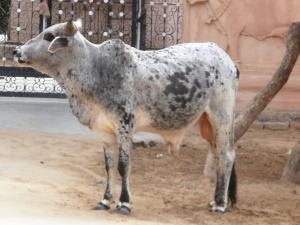Bishnois are avid vegetarians. It is prescribed within their 29 principles and practiced without compromise in all of the families I’ve encountered. Close affinity with wildlife protection and the welfare of all animals means that Bishnois simply don’t contemplate the possibility of eating meat. All of the community is vegetarian from birth, so the very idea of eating meat is unthinkable. In day-to-day conversation, I’ve found many a belligerent standpoint, especially within the Bishnoi youth, imploring all of humankind convert to vegetarianism.
Back home in England, the vast proportion of society is meat eating stock, but intermingled with a significant, and ever-increasing, number of vegetarians and vegans. The vegetarian versus meat eating debate began for me in school and never reached an absolute conclusion. Over the course of many years, I have engaged in tête-à-têtes with carnivores, omnivores, pure vegetarians, eggetarians, pescetarians and vegans from many cultures and backgrounds. In this time I have had spells as a zealous meat eater, even helping with my family farm’s Christmas turkey plucking endeavour, contrasted by times of strictly convicted vegetarian practice. From where I am standing, the answer is not clear cut, black and white, or right and wrong, though I know many people who would strongly disagree with me.
Recently I helped out for a couple of days with a wildlife charity named RAKSHA, which can be translated as ‘protection’ in Hindi. It is a youth movement, full of intelligent, passionate and committed people from all backgrounds and communities. The RAKSHA volunteers carry out an array of activity in Jaipur, aiming to raise awareness of animal protection issues, rescue injured animals, put a stop to the keeping of caged birds and expose illegal snake charmers. Whilst working for them, Tom picked up a document about the benefits of vegetarianism. I found it particularly interesting because it avoided the customary ethical arguments, focusing heartily on scientific and environmental reasons for pursuing a meat-free diet.
My Bishnoi friends thoroughly approve of promoting the vegetarian perspective, so I asked the team at RAKSHA if they would agree to float their points online here at “Meet the Bishnoi” and they eagerly gave me the go-ahead. The general consensus was that we would all be fascinated to hear feedback and different perspectives in this substantial ongoing debate. Therefore please feel free to vote in the poll and post your comments below. Here goes…
Benefits of Being a Vegetarian
Higher life expectancy: Vegetarians live a lot longer, about 7 years longer than meat eaters.
Saving money: Replacing meat, chicken and fish with vegetables and fruit is estimated to cut an average family’s food bills by £2500 per year.
Healthy heart: Cholesterol levels for vegetarians are 14% lower than that of meat eaters.
Reduced risk of cancer: The USA’s National Cancer Institute says that women who eat meat every day are 4 times more likely to get breast cancer than those who don’t.
Weight reduction: Obesity is significantly uncommon in vegetarians and vegans.
Accumulation of harmful toxins in the body: The higher an animal is in the food chain, the more chemicals that accumulate in the tissue. This process is called bioaccumulation. By not eating meat, exposure to accumulated toxins can be avoided.
Help protect the environment: Producing meat puts a heavy burden on natural resources, as compared to growing grain and vegetables, through less efficient use of land and water. Kilogram for Kilogram, all meats result in more CO2 released into the atmosphere than grains and vegetables.
Help reduce famine: 72% of all grain produced in the USA is fed to animals raised for slaughter. It can take 15 pounds of feed to get one pound of meat. If the USA’s total grain output was given directly to people, there would be enough to feed the entire human population. According to the journal ‘Soil & Water’, one acre of land can produce 50,000 lbs of tomatoes, 40,000 lbs potatos, 30,ooo lbs carrots or just 250 lbs of beef.
Bring down national debt: The US spends between $60 and $120 billion annually on the treatment of heart disease, cancer, obesity and food poisoning that are likely bi-products of a diet heavy on animal products.
Preserve fish populations: Our voracious appetite for fish and indiscriminate catching practices has left at least 39% of the oceans’ fish species over-harvested. The Food & Agriculture Organisation reports that 11 of 15 of the world’s major fishing grounds are seriously depleted.
Conserve water: It takes 2500 gallons of water to produce one pound of beef, but just 25 gallons to produce a pound of wheat.
“Be a reason for LIFE not DEATH”
This article has been published thanks to content contribution from RAKSHA. Join the cause or follow their progress by finding them on Facebook, just search for ‘RAKSHA, Jaipur’.

